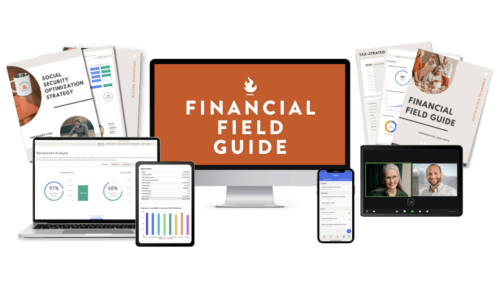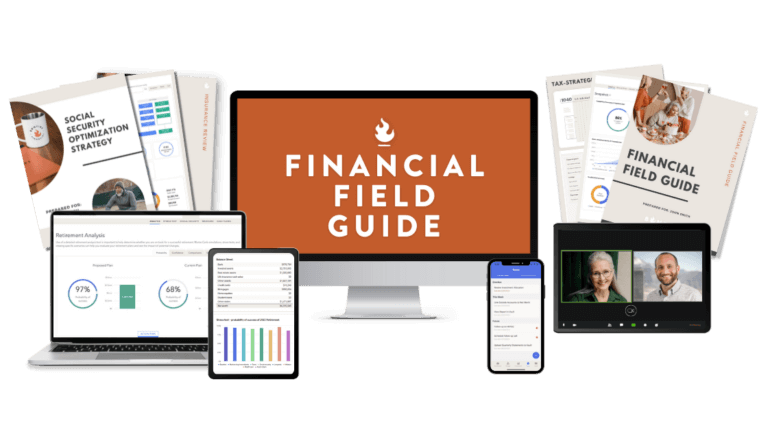THE ULTIMATE LIFE HACK: THE WHAT, WHY AND HOW OF A FINANCIAL PLAN
There seems to be a life hack for everything out there these days. Aluminum foil in the dishwasher for extra shiny spoons, avoiding TSA lines with strollers for faster times, and toothpaste to clear foggy headlights… but what about your finances?
Well, we have the ultimate hack for that …. A financial plan!
The What: Basics of a Financial Plan
Think of a financial plan as your roadmap to financial success. It’s your strategic guide, outlining how to reach your financial goals. Just like a GPS, it helps you navigate through life’s twists and turns, ensuring every dollar is well-spent. It involves setting goals, creating a budget, making smart investments, and managing debt and taxes effectively. In essence, a financial plan is your key to turning aspirations into achievable milestones. It provides clarity and confidence on your financial journey.
No financial plan is the same
Every financial plan is inherently unique. It should be tailored to individual circumstances, goals, and preferences. Factors such as income, expenses, risk tolerance, and life stages contribute to the unique and personalized nature of every financial plan. It will also adapt and evolve with the individual’s journey, guaranteeing adaptability and ongoing relevance as circumstances change. It really is a living document. However, each plan typically has similar components.
Components of a Financial Plan
A comprehensive financial plan typically includes the following key components, again varying based on the individual’s circumstances:
Financial Goals:
Incorporating financial goals into a financial plan provides a clear roadmap, giving purpose and direction to your financial decisions. These goals serve as motivating milestones, guiding your financial choices and fostering a sense of accomplishment as you work towards tangible objectives. It is important to identify short-term and long-term financial objectives.
Emergency Fund:
An emergency fund acts as a financial safety net, providing a buffer against unexpected expenses or sudden income disruptions. Including it in your financial plan ensures you’re equipped to handle unforeseen challenges without derailing your overall stability or long-term goals. Generally, we recommend at least three to six months’ worth of expenses in an emergency fund.
Budgeting:
A budget is the compass of your financial plan, offering a comprehensive overview of both income and expenses. Beyond instilling disciplined spending habits, it establishes a structured framework for strategic allocation. It allows you to prioritize savings, investments, and goals, ultimately contributing to enhanced financial stability and control.
Debt Management:
Incorporating Debt Management into your financial plan is paramount for achieving and sustaining financial well-being. By strategically managing and reducing debt, you not only free up resources for other financial goals but also cultivate a healthier financial profile, fostering long-term stability and reducing unnecessary financial stress.
Savings Plan:
Integrating a savings plan into your financial strategy is crucial for building resilience. It allows you to allocate funds for both future goals and unexpected challenges. This disciplined approach fosters financial security and positions you to achieve long-term objectives with confidence.
Investment Strategy:
An investment strategy in your financial plan acts as a catalyst for wealth growth, leveraging your resources to generate potential returns over time. By carefully selecting investment vehicles aligned with your goals and risk tolerance, you optimize your financial portfolio, working towards long-term prosperity and financial success.
Insurance Coverage:
Are you covered? Including insurance coverage serves as a safeguard, shielding you from unforeseen risks and potential financial setbacks. Whether it’s protecting your health, property, or income, insurance provides a crucial layer of security, ensuring that unexpected events don’t jeopardize your financial stability and long-term goals.
Retirement Planning:
Retirement planning is a cornerstone of a financial plan, ensuring that you can enjoy your golden years with financial confidence and independence. It’s like giving your future self a high-five from the beach of financial freedom. By systematically preparing for retirement in your financial plan, you build a nest egg that aligns with your lifestyle goals, providing peace of mind and the freedom to savor your post-working years.
Social Security Strategy:
A Social Security strategy is essential in retirement planning due to the impact it can have on your financial well-being. Social Security benefits provide a significant source of income for many retirees. However, the timing and manner in which you claim these benefits can significantly affect the overall amount you receive.
Tax Planning:
By strategically navigating the tax landscape within your financial plan, you optimize your financial picture, dodge unnecessary tax potholes, and help to ensure that your money is working for you in the most efficient way possible.
Estate Planning:
Estate planning is the meticulous crafting of your financial legacy. It ensures that your assets are distributed according to your wishes and minimizes the burden on your loved ones. By incorporating estate planning into your financial strategy, you secure a comprehensive roadmap for the future, fostering peace of mind and preserving your financial legacy for generations to come.
Regular Review and Adjustments:
Regular reviews and adjustments are the steering wheel of your financial plan, ensuring it stays aligned with your evolving life circumstances and goals. It should be a flexible guide. By consistently revisiting and adapting, you optimize its effectiveness, making strategic changes as needed to navigate the ever-changing terrain of your financial journey.
The Why: Benefits of Having a Financial Plan
Embarking on a journey without a map can be a daunting prospect, and the same holds true for managing your finances. The benefits of having a well-structured financial plan are akin to having a reliable guide on a mountain expedition. From providing clarity and direction to ensuring efficient resource allocation, a financial plan serves as a powerful tool that empowers you to navigate the complexities of your finances.
Here are our top 5 benefits to having a financial plan.:
Goal Achievement: A financial plan helps you define and prioritize your goals, providing a roadmap for turning aspirations into actionable steps.
Emergency Preparedness: A financial plan includes building an emergency fund, and offering a financial safety net for unexpected expenses or income disruptions.
Wealth Accumulation: A well-crafted financial plan incorporates strategies for savings and investments, allowing you to build wealth over time and work towards financial independence.
Risk Mitigation through Insurance: Integrating insurance into your financial plan safeguards against unexpected events, protecting your health, property, and income.
Retirement Readiness: Planning for retirement is a key aspect, ensuring that you have the necessary funds to enjoy a comfortable and secure post-working life.
Be part of the 35%
According to Schwab’s 2023 Modern Wealth Survey only 35% of Americans have a documented financial plan, and those who have one feel more in control of their finances. Surprisingly, this means that 65% of Americans have no plan.
One of the biggest reasons why most said they don’t have one is that it seems too complicated to create a plan.
Well… we disagree and that is where our life hack comes in.
The How: Getting Started: Tips for Creating Your Financial Plan
A life hack is all about making your life easier, not more difficult. Hence, that is why we have a motto of “Do it for yourself, not by yourself.”
Don’t Complicate it- Get a professional
It can be a complicated process, but with the right people in your corner, it doesn’t have to be. While some people may create their own financial plans, there are several reasons why you might want to seek professional assistance (Like from us… wink, wink) rather than attempting a DIY (Do-It-Yourself) approach:
Expertise: Financial planners and advisors have specialized knowledge and expertise in various aspects of personal finance. Areas of expertise range from investments, tax planning, insurance, and retirement planning. Their experience allows them to provide valuable insights and guidance tailored to your specific situation.
The complexity of the Financial Landscape: The financial landscape is complex, with laws, regulations, and market conditions constantly changing. A professional can help navigate these complexities, ensuring your financial plan remains relevant and effective over time.
Objectivity: An external financial planner provides an objective perspective on your financial situation. Furthermore, this objectivity can be crucial in making unbiased decisions, especially when emotions might cloud judgment in financial matters.
Comprehensive Approach: Furthermore, Financial planners take a holistic approach to your financial well-being. They consider all aspects of your financial life. They help you create an integrated plan that addresses short-term and long-term goals, risk management, and more.
Time and Effort: Ain’t nobody got time for that! Crafting a thorough financial plan requires time and effort. Professionals can efficiently guide you through the process, saving you time and ensuring that no critical aspects are overlooked.
Risk Mitigation: Professionals can help identify and manage potential risks in your plan. Whether it’s investment risk, tax risk, or other uncertainties, their expertise aids in creating strategies to mitigate these risks.
Adaptability: Financial planners are equipped to adapt your plan as your life circumstances change. Whether it’s a career change, marriage, birth of a child, or other life events, professionals can adjust your plan to align with your evolving goals.
Access to Resources: Financial professionals often have access to a broader range of financial tools, resources, and market insights that may not be readily available to individuals.
Accountability: A financial planner can also serve as an accountability coach and financial mentor. As such, they’ll help you stay disciplined and focused on your financial goals, especially during periods of market volatility or economic uncertainty.
Legal and Regulatory Compliance: Professionals are well-versed in legal and regulatory requirements. They can ensure that your financial plan adheres to applicable laws and regulations, preventing unintended legal consequences.
While DIY financial planning is possible, it’s important to recognize your limitations and the potential benefits of seeking professional guidance. A CERTIFIED FINANCIAL PLANNER™ or advisor can bring a level of expertise, objectivity, and comprehensive understanding that may enhance the effectiveness and success of your financial plan.
In Short
Having a well-structured financial plan is not just a strategy; it’s a necessity for securing your financial future. Above all, it’s the roadmap that guides you through life’s uncertainties, ensuring you’re prepared for both the expected and the unexpected. From managing debt to saving for retirement, a sound financial plan touches every aspect of your monetary life, providing peace of mind and a clear path forward.
Next Steps:
Understanding the intricacies of financial planning can be daunting. That’s why we’ve created the Financial Field Guide – a step-by-step guide to help you simplify, navigate, and elevate your financial life. This isn’t just any financial plan; it’s your financial life, broken down into simple, actionable steps. It is a path to a future where you’re in control of your finances, not the other way around.
Don’t leave your financial future to chance. The power to change your financial story is just a click away. Are you ready to unlock it? Get your Financial Field Guide today!
 Client Login
Client Login










